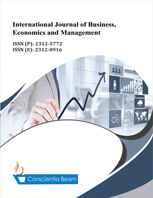Inflation, Oil Revenue, and Monetary Policy Mix in an Oil-Dependent Economy: Empirical Insights from the Case of Nigeria
DOI:
https://doi.org/10.18488/journal.62.2020.72.96.109Abstract
Oil revenues in many nations have remained largely unstable owing to factors like volatility in global oil prices and output regulations among other international and domestic issues, thereby affecting the stability of many oil-dependent economies. This study examines the combined impacts of oil revenue and inflation on the economic growth of Nigeria within the framework of the Autoregressive Distributed Lags models (ARDL) while incorporating selected monetary policy measures in the model to fit into the country’s inflationary scenario amidst dwindling oil revenue in recent times. The empirical result provides evidence that both oil revenue and inflation exert significant diametric impacts on economic growth in Nigeria. While the former demonstrates a positive impact on growth the latter has a negative impact within the period of the study (1981-2017). The Granger Causality test also provides complementary evidence of causality from both oil revenue and monetary policy measures to growth. Considering the vulnerability of oil revenue to external shocks, we strongly recommend mapping out of aggressive diversification program to reduce the current huge dependence on oil proceeds while the monetary authorities keep close tabs on regulating the monetary environment to efficiently mitigate the negative impacts of inflation to facilitate sustainable growth in the long-run.

